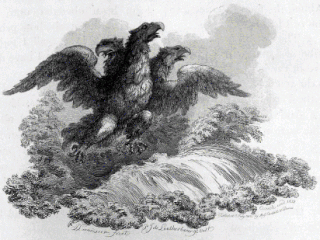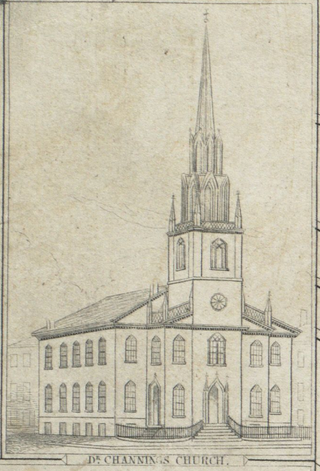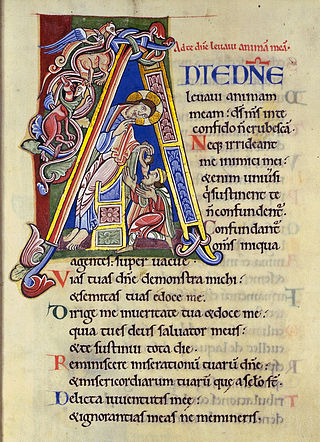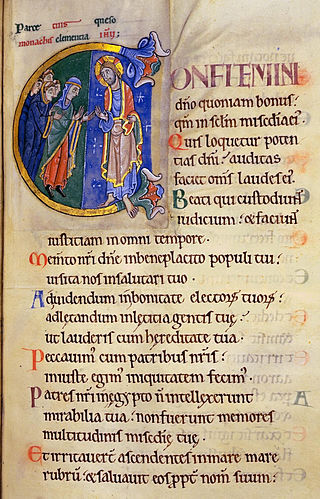Related Research Articles

The Lord's Prayer, also known by its incipit Our Father, is a central Christian prayer that Jesus taught as the way to pray. Two versions of this prayer are recorded in the gospels: a longer form within the Sermon on the Mount in the Gospel of Matthew, and a shorter form in the Gospel of Luke when "one of his disciples said to him, 'Lord, teach us to pray, as John taught his disciples'". Regarding the presence of the two versions, some have suggested that both were original, the Matthean version spoken by Jesus early in his ministry in Galilee, and the Lucan version one year later, "very likely in Judea".

Ezra Stiles was an American educator, academic, Congregationalist minister, theologian, and author. He is noted as the seventh president of Yale College (1778–1795) and one of the founders of Brown University. According to religious historian Timothy L. Hall, Stiles' tenure at Yale distinguishes him as "one of the first great American college presidents."

2 Esdras, also called 4 Esdras, Latin Esdras, or Latin Ezra, is an apocalyptic book in some English versions of the Bible. Tradition ascribes it to Ezra, a scribe and priest of the fifth century BC, whom the book identifies with the sixth-century figure Shealtiel.

Psalm 89 is the 89th psalm of the Book of Psalms, beginning in English in the King James Version: "I will sing of the mercies of the LORD for ever". In the slightly different numbering system used in the Greek Septuagint and Latin Vulgate translations of the Bible, this psalm is Psalm 88. In Latin, it is known as "Misericordias Domini in aeternum cantabo". It is described as a maschil or "contemplation".

The Ten Commandments, or the Decalogue, are religious and ethical directives, structured as a covenant document, that, according to the Hebrew Bible, are given by Yahweh to Moses. The text of the Ten Commandments was dynamic in ancient Israel and appears in three markedly distinct versions in the Bible: at Exodus 20:2–17, Deuteronomy 5:6–21, and the "Ritual Decalogue" of Exodus 34:11–26.

Psalm 83 is the 83rd psalm of the Book of Psalms, beginning in English in the King James Version: "Keep not thou silence, O God". In the slightly different numbering system used in the Greek Septuagint and Latin Vulgate translations of the Bible, this psalm is Psalm 82. In Latin, it is known as "Deus quis similis erit tibi ne taceas". It is one of the 12 Psalms of Asaph. This psalm is the last of the Psalms of Asaph, which include Psalms 50 and 73 to 83. It is also the last of the "Elohist" collection, Psalms 42–83, in which the one of God's titles, Elohim, is mainly used. It is generally seen as a national lament provoked by the threat of an invasion of Israel by its neighbors.

"Honour thy father and thy mother" is one of the Ten Commandments in the Hebrew Bible. The commandment is generally regarded in Protestant and Jewish sources as the fifth in both the list in Exodus 20:1–21 and in Deuteronomy (Dvarim) 5:1–23. Catholics and Lutherans count this as the fourth.

The Bible usually uses the name of God in the singular, generally using the terms in a very general sense rather than referring to any special designation of God. However, general references to the name of God may branch to other special forms which express His multifaceted attributes. The Old Testament/Hebrew Bible reveals YHWH as the personal name of God, along with certain titles including El Elyon and El Shaddai. Jah or Yah is an abbreviation of Jahweh/Yahweh, and often sees usage by Christians in the interjection "Hallelujah", meaning "Praise Yah", which is used to give God glory. In the New Testament the terms Theos, Kyrios and Patēr are additionally used to reference God.

"I am the LORD thy God" is the opening phrase of the Ten Commandments, which are widely understood as moral imperatives by ancient legal historians and Jewish and Christian biblical scholars.

Psalm 3 is the third psalm of the Book of Psalms, beginning in English in the King James Version: "Lord, how are they increased that trouble me!". In Latin, it is known as "Domine quid multiplicati sunt". The psalm is a personal thanksgiving to God, who answered the prayer of an afflicted soul. It is attributed to David and relates in particular to the time when he fled from his son Absalom.

The Federal Street Church was a congregational Unitarian church in Boston, Massachusetts. Organized in 1727, the originally Presbyterian congregation changed in 1786 to "Congregationalism", then adopted the liberal theology of its fifth Senior Minister, William Ellery Channing, (1780–1842). For most of the 18th century the church was known as the Long Lane Meeting-House. In 1788, state leaders met in the relatively spacious building to determine Massachusetts' ratification of the United States Constitution. Thereafter the church renamed itself the Federal Street Church in honor of the event. In 1803, it called William Ellery Channing, (1780–1842), as its minister who defined "Unitarian Christianity" and launched the Unitarian movement, making the Federal Street Church one of the first to define itself as Unitarian.

Psalm 17 is the 17th psalm of the Book of Psalms, beginning in English in the King James Version: "Hear the right, O LORD, attend unto my cry". In the Greek Septuagint and the Latin Vulgate, it is psalm 16 in a slightly different numbering system, "Exaudi Domine iustitiam meam". Its authorship is traditionally assigned to King David.

Psalm 19 is the 19th psalm in the Book of Psalms, beginning in English in the King James Version: "The heavens declare the almighty of God; and the firmament sheweth his handywork." In the slightly different numbering system used in the Greek Septuagint and Latin Vulgate translations of the Bible, this psalm is Psalm 18. The Latin version begins "Caeli enarrant gloriam Dei". The psalm is attributed to David.

Psalm 25 is the 25th psalm of the Book of Psalms, beginning in English in the King James Version: "Unto thee, O LORD, do I lift up my soul.". The Book of Psalms is part of the third section of the Hebrew Bible, and a book of the Christian Old Testament. In the slightly different numbering system used in the Greek Septuagint and Latin Vulgate translations of the Bible, this psalm is Psalm 24. In Latin, it is known as "Ad te Domine levavi animam meam". The psalm, attributed to David, has the form of an acrostic Hebrew poem.

Psalm 80 is the 80th psalm of the Book of Psalms, beginning in English in the King James Version: "Give ear, O Shepherd of Israel, thou that leadest Joseph like a flock". In the slightly different numbering system used in the Greek Septuagint and Latin Vulgate translations of the Bible, this psalm is Psalm 79. In Latin, it is known as "Qui regis Israel intende". It is one of the 12 Psalms of Asaph. The New American Bible calls it "a prayer for Jerusalem". The Jerusalem Bible describes it as "a prayer for the restoration of Israel".

Psalm 85 is the 85th psalm of the Book of Psalms, one of a series of psalms attributed to the sons of Korah. In the English of the King James Version, this psalm begins: "LORD, thou hast been favourable unto thy land". In the slightly different numbering system used in the Greek Septuagint and Latin Vulgate translations of the Bible, this psalm is Psalm 84. In Latin, it is known as "Benedixisti Domine terram tuam". In Judaism, it is called "a psalm of returned exiles". The Jerusalem Bible describes it as a "prayer for peace".

Psalm 99 is the 99th psalm of the Book of Psalms, beginning in English in the King James Version: "The LORD reigneth; let the people tremble". The Book of Psalms starts the third section of the Hebrew Bible, and, as such, is a book of the Christian Old Testament. In the slightly different numbering system in the Greek Septuagint version of the Bible, and in the Latin Vulgate, this psalm is Psalm 98, beginning "Dominus regnavit". It is the last of the set of additional Royal Psalms, Psalms 93-99, praising God as the King of His people. There is no title in the Masoretic text version, but the Septuagint provides a title: "A psalm of David".

Psalm 106 is the 106th psalm of the Book of Psalms, beginning in English in the King James Version: "Praise ye the LORD. O give thanks unto the LORD; for he is good". The Book of Psalms is part of the third section of the Hebrew Bible, and a book of the Christian Old Testament. In the slightly different numbering system used in the Greek Septuagint and Latin Vulgate translations of the Bible, this psalm is Psalm 105. In Latin, it is known by the incipit, "Confitemini Domino quoniam bonus". Alexander Kirkpatrick observes that the two historical psalms, Psalms 105 and 106, are closely related. Psalm 105 gives thanks for God's faithfulness to the covenant he made with Abraham; Psalm 106 is a psalm of penitence, reciting the history of Israel's faithlessness and disobedience. He also notes that this psalm and Psalm 107 "are closely connected together", arguing that "the division of the fourth and fifth books does not correspond to any difference of source or character, as is the case in the other books".

Ezra Stiles Ely was an American Presbyterian minister during the Second Great Awakening.

2 Chronicles 7 is the seventh chapter of the Second Book of Chronicles the Old Testament in the Christian Bible or of the second part of the Books of Chronicles in the Hebrew Bible. The book is compiled from older sources by an unknown person or group, designated by modern scholars as "the Chronicler", and had the final shape established in late fifth or fourth century BCE. This chapter belongs to the section focusing on the kingship of Solomon. The focus of this chapter is the conclusion of dedication ceremony and God's covenant for the temple.
References
- ↑ [untitled] The North American Review, (1861-04-01), pages 580-582. The North American Review. 1861-04-01.
- ↑ Sassi, Jonathan D. (2001). A republic of righteousness : the public Christianity of the post-revolutionary New England clergy. Internet Archive. Oxford ; New York : Oxford University Press. ISBN 978-0-19-512989-2.
- ↑ Belcher Foundation website
- ↑ Digital Commons, online document, page 14
- ↑ Digital Commons website, University of Nebraska (Lincoln)
- ↑ Bible Gateway, Deuteronomy Chapter 30, And the Lord thy God will make thee plenteous ... If thou shalt hearken unto the voice of the Lord thy God, to keep his commandments
- ↑ GoodReads website
- ↑ The American Vision websitge
- ↑ Founders Online website, Archive page